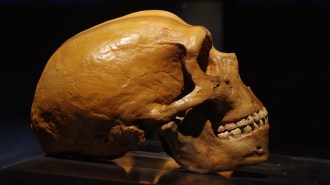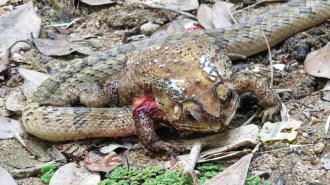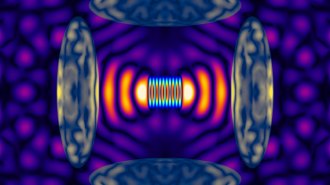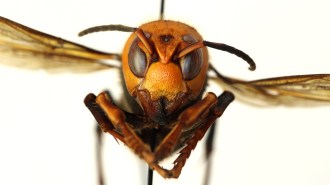All Stories
-
 Neuroscience
NeuroscienceYour dog’s brain doesn’t care about your face
Comparing brain scans of people and pups shows that faces hold no special meaning to the brains of dogs, a new study suggests.
-
 Health & Medicine
Health & MedicineHepatitis C discoveries win 2020 Nobel Prize in physiology or medicine
The 2020 medicine Nobel recognizes work that found that a novel virus was to blame for chronic hepatitis and led to a test to screen blood donations.
-
 Paleontology
PaleontologyCannibalism in the womb may have helped megalodon sharks become giants
The ancient sea terror Otodus megalodon may have grown to at least 14 meters long thanks to a firstborn pup’s predatory behavior, some researchers say.
-
 Health & Medicine
Health & MedicineWhat does COVID-19 vaccine efficacy mean?
The initial goal for a vaccine against COVID-19 is to reduce cases of the disease by at least 50 percent in those vaccinated versus those not.
-

-

Seeing a bright future for science in these innovators
Editor in chief Nancy Shute writes about the process of finding and profiling the scientists who make up the SN10.
By Nancy Shute -
 Health & Medicine
Health & MedicineNeandertal genes in people today may raise risk of severe COVID-19
People in South Asia and Europe are more likely to carry a genetic heirloom from Neandertals linked to susceptibility to the coronavirus.
-
 Animals
AnimalsThis snake rips a hole in living toads’ stomachs to feast on their organs
A particularly gruesome way to kill may help small-banded kukri snakes avoid toxins secreted from the neck and backs of some toads.
-
 Tech
TechA new thermometer measures temperature with sound
An acoustic thermometer takes temperature by listening to the faint hum that objects give off when they get hot.
-
 Life
LifeA new map shows where Asian giant hornets could thrive in the U.S.
Suitable habitat along the Pacific West Coast means so-called “murder hornets” could get a foothold in North America if they aren’t eradicated.
-
 Space
SpaceThe first black hole image helped test general relativity in a new way
The Event Horizon Telescope’s iconic image of the black hole at the center of galaxy M87 once again shows Einstein was right.
-
 Life
LifeBefore migrating, some blue whales switch up the timing of their songs
Pacific blue whales change the daily timing of their songs ahead of migration, helping scientists better anticipate these massive animals’ movements.
By Jake Buehler